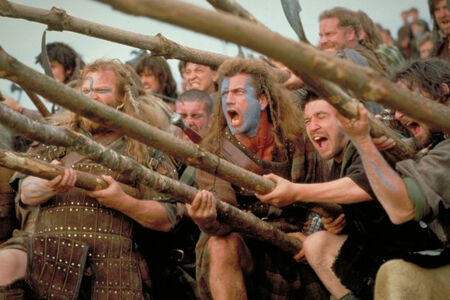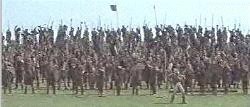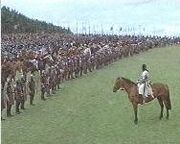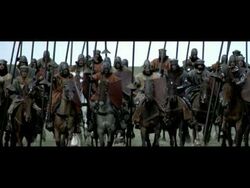Nothanksm8 (talk | contribs) No edit summary Tags: Visual edit apiedit |
No edit summary |
||
| (6 intermediate revisions by 5 users not shown) | |||
| Line 1: | Line 1: | ||
{{Battle |
{{Battle |
||
|battle_name = Battle of Stirling |
|battle_name = Battle of Stirling |
||
| − | |image = [[File: |
+ | |image = [[File:Stirling.jpg|450px]] |
|caption = The Scottish raise their spears |
|caption = The Scottish raise their spears |
||
|conflict = [[War of Scottish Independence]] |
|conflict = [[War of Scottish Independence]] |
||
| Line 14: | Line 14: | ||
|casualties1 = few |
|casualties1 = few |
||
|casualties2 = annihilated |
|casualties2 = annihilated |
||
| − | |campaign = Scotland}} |
+ | |campaign = Scotland}}The '''Battle of Stirling''' was the first major victory of the Scottish rebellion. |
| − | Stirling Scotland rebel war that first great victory. |
||
== Battle == |
== Battle == |
||
| − | [[File:Scottish_army.jpg|thumb|250px|The Scottish army]][[File:English_army.jpg|thumb|The English army]] |
+ | [[File:Scottish_army.jpg|thumb|250px|The Scottish army]][[File:English_army.jpg|thumb|The English army]]The Scottish had won in a few skirmishes under command of the commoner [[William Wallace|William]] Wallace, and the city of Lanark was freed from English rule. While the King of England, [[Edward I]], went to France to expand his future kingdom, his feeble son [[Prince Edward]] did nothing and preferred to spend time with his partner [[Philip]]. But the Northern Army, 13,000-strong under the command of [[Lord Talmadge]] and [[Lord Cheltham]], [[File:English_Cavalry.jpg|thumb|250px|The English knights charge.]] invaded. The Scottish nobles made an alliance with William, and though [[Robert the Bruce]] did not join the battle, [[Mornay]], [[Lochlan]], and [[Craig]] aided Wallace's cause with their cavalry. The English heavy cavalry had not been beaten in two centuries, and were feared by their opponents. So Wallace constructed 24-ft spears using the trees from the highlands, and wanted to use them to kill the horsemen and the riders. The Scottish also constructed several shields, painted partially blue like their faces, trying to show Scottish pride. The Scottish plan was for Mornay and his cavalry to run behind the hills and take out the English archers from behind, and the English would believe that they were running away if they ran to the rear. The English plan was to charge and launch a full attack to wipe out the Scottish. |
| − | |||
| − | |||
| − | |||
| − | When the two sides met in Stirling, Scotland, the English thought they thought they were going to win and lose. Due to motivate veterans, most Scots want to run. They are, they did not win because of the warlords did, or because there is not war conditions and England, these days will be an opportunity to serve. But Wallace has a strange language, they join their community, and close one-man kept running. Wallace was traded and Cheltham Cheltham Scottish lords promised land in England. Theft, rape and murder in 100 years to apologize for the ladder-stepping and stopping Wallace, Scotland, and presented them to the members. Cheltham clearly diminished, and both sides prepared for battle. First, the English began to show their nakedness to provoke them to shoot the Scottish ordered his archers. Scottish missing and their bodies, and some arrows to pick up their shields. Then they mooned bending the English language and their kilts stretching, but this time, they were caught off guard by the arrow. Other Scottish soldiers killed at this time, and the cavalry running according to plan. Talmazh, excited, like grass, drive the enemy to attack, ordered the cavalry. Polish cavalry attacked, unaware that the Scots were launched. At the last second Scot raised his spear and sent the horses, pack animals and heart death knights. Had threatened to attack the British cavalry were destroyed. Order Talmazh Cheltham Scottish infantry load and lead times also. When they met in the center, there was a fierce battle. Scotland won and cracked heads, hands and feet, and cut the man's head, chest and neck, and it was very difficult to fight. Wales defeated Mornay archers and cavalry, and ordered his bodyguards to escape Talmazh retreat. But the infantry, was on the field, and the blood continues to struggle. Wallace's sword shook Cheltham, cut her head as she tried to get up before the overthrow. British infantry were killed or injured in the last Mornay and Wallace was the way they are organized in the center. Wallace encouraged by men! "The sword hit the floor to celebrate the victory. He was knighted and became high a guardian and protector of Scotland. It was in Scotland last fight as a celebration of freedom |
||
| + | When the two armies met on the field at Stirling, the English thought that they would win and the Scottish thought they would lose. Thanks to the motivation of a [[veteran]]'s words, much of the Scots wanted to flee. They felt that they had no chance of winning because of numbers if the lords did make war, or because if they did not make war and accept England's terms, they would be slaves still. But Wallace gave an astounding speech that rallied his men, and not one of the retreating men continued fleeing. When Wallace and Cheltham headed to parley, Cheltham promised the Scottish lords land in England. Wallace delivered Scotland's terms: retreating and stopping at every town to beg forgiveness for 100 years of theft, murder, and rape. Cheltham obviously refused, and the two sides prepared for battle. First, the English ordered their archers to fire when the Scottish started showing off their privates to them in order to taunt them. The Scottish ducked down and held their shields over their bodies, deflecting the arrows, and only a few were hurt. Then, they mooned the English by bending down and pulling up their kilts, but this time, they were caught unprepared by the arrows. More Scottish soldiers were killed this time, and the cavalry fled as according to plan. Talmadge, excited, ordered the cavalry to launch a full attack, to ride the enemy down like grass. The English cavalry charged, unsuspecting that the Scots had spears. At the last second, the Scots raised their spears and aimed them at the horses' hearts, killing the beasts of burden and the knights. The attack was repelled, and the English cavalry were annihilated. Frustrated, Talmadge ordered Cheltham to lead the infantry in a charge, while the Scottish charged as well. When they met in the center, savage fighting ensued. The Scottish had the upper hand, and hacked heads, arms, and legs off, and stabbed people in the heads, chests, and necks, and it was a very brutal fight. Mornay and the cavalry defeated the [[Wales|Welsh archers]] and Talmadge ordered a retreat of his personal bodyguard, narrowly escaping. But the infantry remained on the field, and the bloody battle continued. Wallace swung his sword at Cheltham, unhorsing him, before lopping his head off as he tried to get up. The last of the English infantry were killed or lay wounded, and Mornay met Wallace in the center as they arranged. The men cheered on "Wallace!", and he stabbed his sword into the ground to commemorate the victory. He was knighted and made both guardian and High Protector of Scotland. This was the last battle over Scotland, as it marked its independence. |
||
[[Category:Battles]] |
[[Category:Battles]] |
||
[[Category:Events]] |
[[Category:Events]] |
||
Revision as of 03:11, 23 August 2020
| Battle of Stirling | |||
|---|---|---|---|
 The Scottish raise their spears | |||
| Conflict: War of Scottish Independence | |||
| Date: September 11, 1297 | |||
| Place: Stirling, Scotland | |||
| Outcome: Inconclusive | |||
| Combatants | |||
| Commanders | |||
| Strength | |||
| 2,000 Scottish troops 300 cavalry |
10,000 infantry 3,000 heavy cavalry | ||
| Casualties | |||
| few | annihilated | ||
| |||
The Battle of Stirling was the first major victory of the Scottish rebellion.
Battle

The Scottish army

The English army
The Scottish had won in a few skirmishes under command of the commoner William Wallace, and the city of Lanark was freed from English rule. While the King of England, Edward I, went to France to expand his future kingdom, his feeble son Prince Edward did nothing and preferred to spend time with his partner Philip. But the Northern Army, 13,000-strong under the command of Lord Talmadge and Lord Cheltham,

The English knights charge.
invaded. The Scottish nobles made an alliance with William, and though Robert the Bruce did not join the battle, Mornay, Lochlan, and Craig aided Wallace's cause with their cavalry. The English heavy cavalry had not been beaten in two centuries, and were feared by their opponents. So Wallace constructed 24-ft spears using the trees from the highlands, and wanted to use them to kill the horsemen and the riders. The Scottish also constructed several shields, painted partially blue like their faces, trying to show Scottish pride. The Scottish plan was for Mornay and his cavalry to run behind the hills and take out the English archers from behind, and the English would believe that they were running away if they ran to the rear. The English plan was to charge and launch a full attack to wipe out the Scottish.
When the two armies met on the field at Stirling, the English thought that they would win and the Scottish thought they would lose. Thanks to the motivation of a veteran's words, much of the Scots wanted to flee. They felt that they had no chance of winning because of numbers if the lords did make war, or because if they did not make war and accept England's terms, they would be slaves still. But Wallace gave an astounding speech that rallied his men, and not one of the retreating men continued fleeing. When Wallace and Cheltham headed to parley, Cheltham promised the Scottish lords land in England. Wallace delivered Scotland's terms: retreating and stopping at every town to beg forgiveness for 100 years of theft, murder, and rape. Cheltham obviously refused, and the two sides prepared for battle. First, the English ordered their archers to fire when the Scottish started showing off their privates to them in order to taunt them. The Scottish ducked down and held their shields over their bodies, deflecting the arrows, and only a few were hurt. Then, they mooned the English by bending down and pulling up their kilts, but this time, they were caught unprepared by the arrows. More Scottish soldiers were killed this time, and the cavalry fled as according to plan. Talmadge, excited, ordered the cavalry to launch a full attack, to ride the enemy down like grass. The English cavalry charged, unsuspecting that the Scots had spears. At the last second, the Scots raised their spears and aimed them at the horses' hearts, killing the beasts of burden and the knights. The attack was repelled, and the English cavalry were annihilated. Frustrated, Talmadge ordered Cheltham to lead the infantry in a charge, while the Scottish charged as well. When they met in the center, savage fighting ensued. The Scottish had the upper hand, and hacked heads, arms, and legs off, and stabbed people in the heads, chests, and necks, and it was a very brutal fight. Mornay and the cavalry defeated the Welsh archers and Talmadge ordered a retreat of his personal bodyguard, narrowly escaping. But the infantry remained on the field, and the bloody battle continued. Wallace swung his sword at Cheltham, unhorsing him, before lopping his head off as he tried to get up. The last of the English infantry were killed or lay wounded, and Mornay met Wallace in the center as they arranged. The men cheered on "Wallace!", and he stabbed his sword into the ground to commemorate the victory. He was knighted and made both guardian and High Protector of Scotland. This was the last battle over Scotland, as it marked its independence.